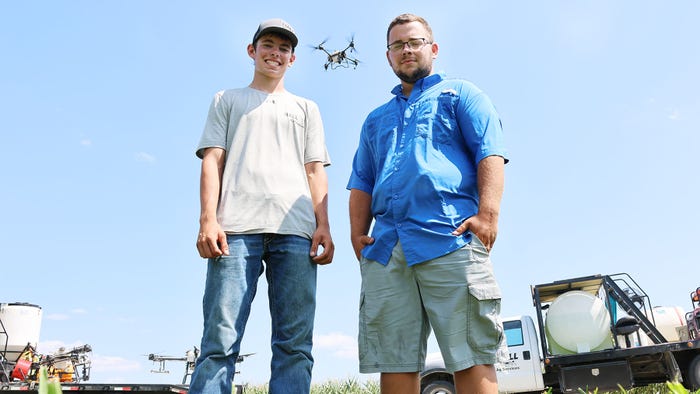
LIFT-OFF: Brothers Chase (left) and Avery Hall launched a drone spraying business just three years ago. Word spread, and the duo now travels across northeast Missouri during the summer.Mindy Ward
Drones flying over cornfields are common in the Heartland; however, the age of their pilots may surprise you.
Take for instance Avery Hall, a junior at the University of Missouri-Columbia, and his brother, Chase, a senior at Clopton High School. The two ag entrepreneurs from Paynesville, Mo., started their aerial custom application business three years ago and have already built a client base that reaches across northeast Missouri.
Like many new businesses, it began as an idea: to use drones in the family’s row crop operation.
“We were looking at making multiple applications of fungicide over corn during the summer,” Avery explains. “We wanted to test products side by side to see what kind of yield advantage you can really produce with these various products. Drones were the most cost-effective way to do that.”
From there, word spread throughout the countryside about the Hall brothers using drones for aerial fungicide applications, and others wanted in. So the duo expanded to include custom application.
Today, Hall Ag Services’ territory reaches from Montgomery County on the west side to the Mississippi River in the east.
“There are a lot more people looking for aerial custom application when corn tassels,” Avery says.
“Not every farmer is going to own a helicopter or plane for that application,” Chase adds. “It’s just not feasible. That is where drones really fit into the equation.”
Building a drone business
Not all farmers want to go through the extensive licensing process to own or operate a drone.
However, the brothers agree that the process was worth it to be able to bring new crop management practices to their own farm — and now to others.
Avery says it’s hard to beat the coverage farmers get with a drone application. “You can apply fungicides at the right time and the right altitude to make a difference for the crops,” he says.
Hall Ag Services has grown so much that the brothers added a second crew, more drones and additional equipment to manage their newfound customer base.
Designing a system that works
Hall Ag Services owns four DJI drones, and each brother has a unique transportation setup.
A flatbed gooseneck trailer is outfitted with all they need while on the job. The lower deck houses two drones, chemicals and other equipment. The upper deck looks a little more like the front end of a bass fishing boat equipped with two chairs and an umbrella, but it is not for sitting back and relaxing on the job.
“We have to maintain line of sight with these drones,” Avery explains. “We are flying over tall corn. We need to be able to see it for a long distance across a field.”
Chase adds that the added height of the upper deck allows the pilot to either stand or sit to maneuver the drone into place. “You have to be alert at all times because in a split-second, things can go wrong,” he says.
As for the large umbrella? “It gets hot on some days,” Chase quips.
Both agree that they would rather have a cool and cloudy day to fly because the drone battery stays cool, and it can cover more ground.
Learning advanced spray tech
While this generation grew up with technology at their fingertips, the Hall brothers still put in hours learning the intricacies of a drone and a smart remote controller.
Fortunately, both grew up on a farm and like tinkering with equipment. It also helps that Avery is a double major in ag systems technology and ag business management at Mizzou. Chase will join him at MU in the fall.
The two also were able to use their row crop production prowess when it came to mixing and calculating chemicals.
Despite training, education and experience, the Hall brothers admit that there is a learning curve when using drones for aerial applications in agriculture.
“We put in a lot of flying hours on our own farm, making sure we were operating efficiently and safely,” Avery says. “We wanted to get it right before applying on other farmers’ fields.”
Using drones to spray crop protection products continues to be a topic of interest in agriculture. While farmers use the technology for aerial imagery of crops to determine disease and pest pressure along with nutrition needs, more are employing young farmers and entrepreneurs, like the Hall brothers, for aerial application of chemicals.
For Avery, an ag drone is “just one more tool that our generation will have to use on the farm to help make us more profitable and sustainable.”
About the Author(s)
You May Also Like






